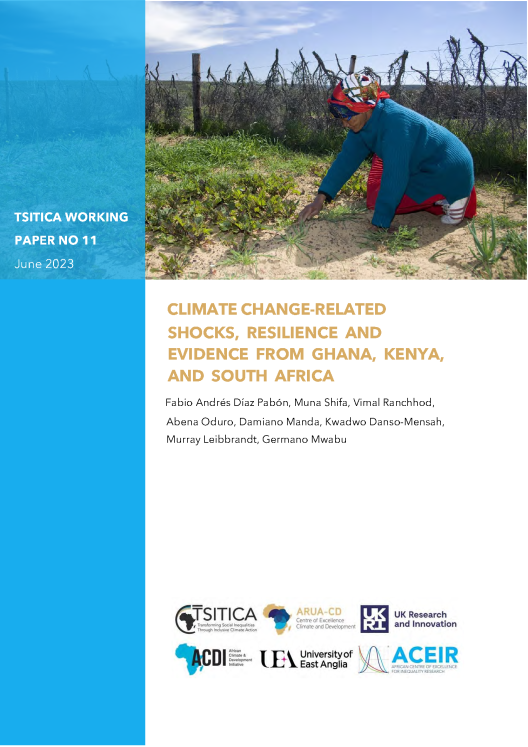Climate change-related shocks, resilience and welfare outcomes: Evidence from Ghana, Kenya and South Africa
Fabio Andrés Diaz Pabon, Muna Shifa, Vimal Ranchhod, Abena Oduro, Damiano K. Manda, Kwadwo Danso-Mensah, Murray Leibbrandt, Germano Mwabu
TSITICA Project Working Paper no. 11, June 2023.
Published by ARUA Centre of Excellence in Climate Change and Development & African Centre of Excellence for Inequality Research.

This paper introduces the approach taken to analyse the impact of climate change-related shocks on household welfare outcomes in Ghana, Kenya, and South Africa. The document reviews discussions on the diverse effects of climate change shocks on livelihoods and welfare, as well as the extent to which coping mechanisms mitigate these negative impacts. The paper emphasises the use of assets as a framework for understanding resilience to climate change shocks, illustrating how varying asset levels relate to different welfare outcomes when households face such shocks. The evaluation of how climate change shocks, such as droughts and floods, affected household welfare in the three countries is described. Employing an asset lens allowed for the characterisation of households' resilience and vulnerability to climate change shocks in these contexts.
The paper outlines the data sources, quantitative methods, and identification strategy employed in each country to account for the interaction between climate change shocks, welfare outcomes, and assets. Additionally, the paper presents findings from the case studies, highlighting how the composition of asset portfolios shapes welfare outcomes in the face of climate change shocks, such as droughts or floods. It is observed that these shocks have a compounding effect, depleting assets, impacting livelihoods, and exacerbating poverty. However, this effect is more pronounced for households with fewer assets, and its manifestation varies depending on the specific contextual factors surrounding the shocks. Thus, different dynamics are observed between Ghana, Kenya, and South Africa. Read more
TSITICA was a collaborative, multi-country interdisciplinary research project. It brought together two ARUA Centres of Excellence with researchers from the universities of Ghana, Nairobi and Cape Town, and from the UK universities of Bristol, East Anglia and Manchester and the London School of Economics. The support of the African Research Universities Alliance and UK Research and Innovation are gratefully acknowledged. Visit project website.
